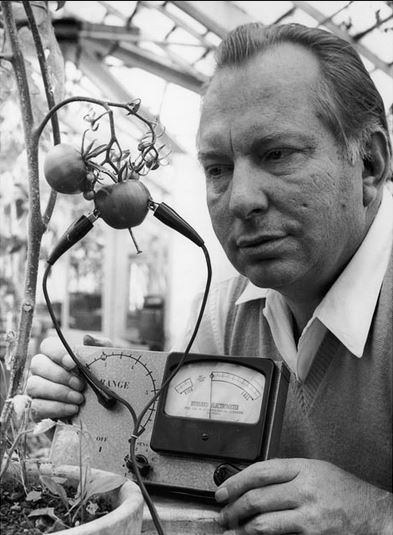Hubbard was likely inspired by Cleve Backster, who had made similar claims based on connecting plants to a polygraph starting in 1966. Backster published his claims in the Journal of Parapsychology in 1968, and his work was subsequently popularized in the 1973 book, The Secret Life of Plants.
I wonder, however, whether the inspiration for both of these crackpots came from a piece of fiction in the September 17, 1949 issue of The New Yorker--Roald Dahl's "The Sound Machine," which is reprinted in numerous short story collections, including his volume Someone Like You (1973). In this tale, a man named Klausner, obsessed with sounds beyond the ability of human beings to hear, builds a machine to convert higher pitches into human-audible sounds. He discovers, to his horror, that plants and trees shriek with pain when cut.
Does anyone know of any documented references from Hubbard or Backster to Dahl? Or is there another common ancestor I've missed?
My title includes a reference to the Seattle-area grunge band, Screaming Trees, whose Wikipedia entry doesn't comment on the origin of their name--but Dahl's story seems a likely inspiration there, too.
UPDATE (6 February 2013): It looks like the Hubbard photo pre-dates Backster, and was likely taken in 1959 or 1960! It prompted a feature titled "PLANTS DO WORRY AND FEEL PAIN." in the December 18, 1959 Garden News.
UPDATE (10 February 2013): David Hambling's "The Secret Life of Plants" in the December 2012 issue of Fortean Times (p. 18) points out that Charles Darwin's 1880 The Power of Movement in Plants suggested that plants have something like a nervous system, and that Jagadish Chandra Bose published a 1907 paper on the electrophysiology of plants. He puts Backster before Hubbard, making the same mistake of dating Hubbard's claims by the Life magazine photo caption.
Backster, by the way, was inspired by Bose's work. He says that he started his work with plants on February 2, 1966, as reported in the introduction of his "Evidence of a Primary Perception in Plant Life," International Journal of Parapsychology, Vol. X, No. 4, Winter 1968, pp. 329-348.
UPDATE (21 October 2021): On a 1966 episode of the Joe Pyne Show, in discussion with Lewis Marvin, Pyne asserted that it has been scientifically proven that tomatoes scream when cut, likely referencing Backster.
UPDATE (5 December 2022): Not sure how I missed including the Jack Handy "Deep Thoughts" that goes: "If trees could scream, would we be so cavalier about cutting them down? We might, if they screamed all the time, for no good reason."

I think another possible inspiration for the Screaming Trees name was the quote from Jack Handy listed here, which apparently happened just before the Screaming Trees formed: http://en.wikipedia.org/wiki/Jack_Handy#Deep_Thoughts
ReplyDeleteAh, good find, Mark. "If trees could scream, would we be so cavalier about cutting them down? We might, if they screamed all the time, for no good reason." That was apparently published in _Deep Thoughts_ in 1992, and aired on Saturday Night Live on October 21, 1991, though, while the band formed in 1985. I know some of Handy's material was published much earlier (in the 1980s in _Omni_ magazine), but don't know if that specific example was among them.
ReplyDeleteThe tree people in Lord of the Rings, when they saw the wholesale slaughter of trees at Eisengaard, screame for their loss. All those psychedelic/stoner bands like Rush and Led Zeppelin wrote songs about Lord of the Rings. It would seem fitting to their image as well! that's my two cents worth, and the result of watching the film and subsequent Google search ;^)
ReplyDeletenot screaming trees, but ...
ReplyDeletehttp://thesmartset.com/article/article11221101.aspx
If You Pick Us, Do We Not Bleed?
By Stefany Anne Golberg
In a room near Maida Vale, a journalist for The Nation wrote around 1914, an unfortunate creature is strapped to the table of an unlicensed vivisector. When the subject is pinched with a pair of forceps, it winces. It is so strapped that its electric shudder of pain pulls the long arm of a very delicate lever that actuates a tiny mirror. This casts a beam of light on the frieze at the other end of the room, and thus enormously exaggerates the tremor of the creature. A pinch near the right-hand tube sends the beam 7 or 8 feet to the right, and a stab near the other wire sends it as far to the left.
“Thus,” the journalist concluded, “can science reveal the feelings of even so stolid a vegetable as the carrot.”
Just some bozo?
In Stephen King's Salem's Lot, he refers to 'the screaming trees'.
ReplyDeleteThe "screaming trees" was a place in Nazi concentration camps (I believe Auschwitz) where screams could be heard coming from trees hiding tortures that the Jews were made to march by. I've read about this in a book (a long time back) where they were actually called "screaming trees" so that's most likely where they got the band name, at least that's what I've always assumed. They wouldn't be the first punk band to take their name from Nazi/Holocaust stuff, i.e. Joy Division, and Siouxsie Sioux wore swasticas, etc. I know this is depressing to talk about but I believe that's where they got the name.
ReplyDelete